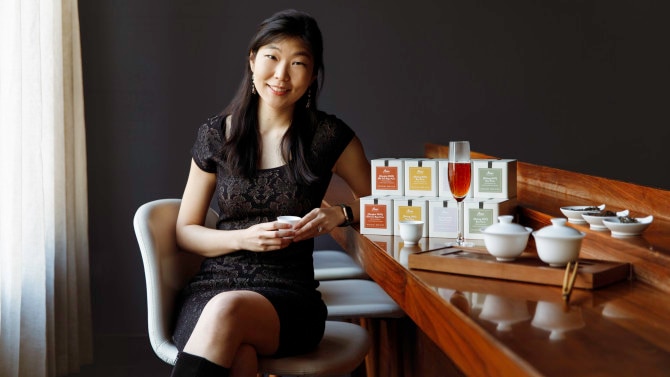Ashley Lim

Founder and CEO,
Mansa Tea
Building the future of artisanal tea
A former healthcare consultant launches artisanal tea company
What were your early years like?
I grew up in South Korea, Hawaii, and New Jersey. I was a health-conscious child, and also very inquisitive — especially when it came to food, maybe because my grandmother suffered from health complications related to obesity. Even at 7 years old, I remember ordering chocolate sorbet instead of chocolate ice cream because I thought it was healthier. And in high school, I wrote a research paper about the effects of organic products on health.
What led you to study chemistry at Columbia and then get your MBA at Wharton?
Initially, I wanted to study food science because I knew I wanted to lead a health food company one day. But my parents convinced me to focus on chemistry for a more general education. My mentor at Columbia, a former consultant herself, then suggested I explore consulting to build my business and leadership skills.
How was your experience at PwC?
It was really eye-opening to have so much exposure to so many people in high levels of leadership at an early stage in my career. I learned invaluable client-service skills and professionalism, as well as the importance of asking questions.
Why did you leave consulting to launch a tea company?
After several years of consulting, I wanted to follow my own passion and interest. Tea was an obvious choice for me. First, I love it. My dad's an entrepreneur, and he would often travel to China, bringing back a fermented tea known as pu’er tea that has such a powerful aroma and a buttery mouth feel. I grew up drinking that kind of tea. It’s delicious and great for digestion. It can suppress weight gain and cholesterol levels. It has zero calories and no added flavoring or ingredients. Then later, as an adult, I noticed that high-quality wine and single-origin coffees were becoming increasingly available. So I wondered, why was it that such low-quality tea bags were still being served at highly rated restaurants in New York City? Why are blended teas still so popular when we don't drink hazelnut-flavored coffee anymore?
I wanted to help open people's eyes to the amazing world of real tea, just the way I experienced it when my dad first brought it over from China for me.
What’s your long-term vision for your company?
I’m really committed to expanding tea education. I believe that high-quality tea is as important as high-quality coffee and wine. Right now, I’m focused on selling the best artisanal tea, sourced from Asia, to world renowned restaurants and hotels. We age our tea leaves to the peak of their flavor, and we hope that people will appreciate our tea menus that give details on where teas come from and what vintage they are. As we grow, we hope to expand more products direct-to-consumer. And to do that, we’ll need to educate people about the differences between high-quality and lower-quality teas.
What’s the best part of running your own business?
Sharing my passion for tea with others. I love running tea workshops and private events and hearing feedback directly from customers who say such like, "Wow, I've never had tea like this.” That really makes me believe in what I'm doing.
What’s the biggest challenge you face as an entrepreneur?
It’s kind of a double-edged sword, actually. The thing I love most, consumer education, is also that hardest part of our mission. People are used to drinking herbal teas and blends, or bubble teas, which are heavily sweetened to hide the lower quality tea that they use. So changing the customer's palate for higher-quality tea will be the long-term challenge we need to tackle.
How would you describe your leadership style?
I try to be a democratic leader. I want to hear ideas from everyone on our team, no matter how experienced or inexperienced they are.
How did you become a tea sommelier?
I trained at the UK Tea Academy in London, which is run by Jane Pettigrew. She's a renowned tea historian and educator.
How many cups of tea do you drink a day?
Probably 10 cups — but that’s based on an English tea cup size, not a gigantic mug cup!
How do you brew your tea?
I enjoy multiple infusions using a porcelain gaiwan to carve out different flavor profiles. This style of brewing is called gongfu brewing. The ritual itself helps me remove myself and really focus on the process. It’s very relaxing for me.

Any advice for aspiring entrepreneurs?
You have to have passion and motivation behind what you’re building. Entrepreneurship is a high-risk road with a lot of ups and downs, like riding a roller coaster, and often just in one day. And there are certainly easier ways to make money. But if you believe in something, and you want to share it with other people, this is the most rewarding way to do it.
How do you stay motivated?
My fiancé is extremely supportive and his encouragement really helps. He, and my family overall, remind me to look at our wins, both big and small. That perspective lets me see that we're on the right path and we’re hitting the benchmarks we set for ourselves.
Outside of work, when and where do you find yourself happiest?
During ballet classes. Dancing is something I started doing in high school and it has become a big part of my life. It centers me and makes me feel very present.
What’s your motto?
Follow your heart and remember it’s never too late to start.
This interview was conducted and edited by Jen Swetzoff, founder of CLOSEUP, a creative content studio in Brooklyn. She was formerly the deputy managing editor at strategy+business magazine.


